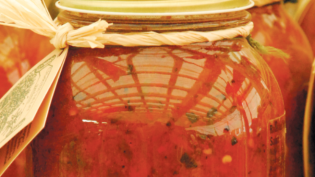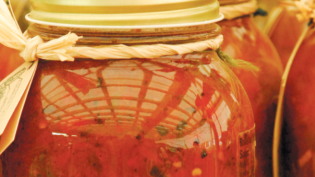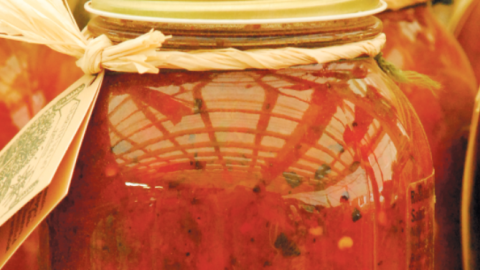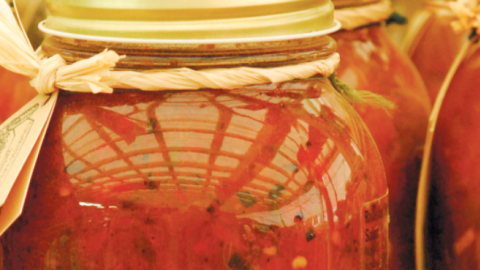100 Mile Diet: I Think I Can, I Think I Can
Karen Mangia and Thom England go the extra mile for year-round good eating. In fact, they'll go a hundred miles for good, clean, fair food – but no more.
Mangia, an executive at a technology center, and England, a chef and culinary instructor, adopted the 100-mile diet as a personal challenge three years ago after reading Barbara Kingsolver's Animal, Vegetable, Miracle. The only items they consume from beyond that perimeter are staples like certain flours, olive oil, sugar and coffee (but the coffee beans are locally roasted by Bjava Coffee).
What sets the Carmel couple apart is their commitment through the winter months, when many a local food enthusiast caves to the convenience of out-of-season supermarket produce. Mangia and England turn to the produce that they canned, pickled, froze or preserved otherwise earlier in the year.
Their desire to eat only foods from within a 100-mile radius has given new depth to their relationship with Mangia's grandparents, who offered lessons in "putting food by." Along the way they've also cultivated a network of farmers and likeminded people, and occasionally share their culinary adventures on their blog, indychef.blogspot.com.
The couple took the transition to the 100-mile diet in several stages. Before returning to his native Indiana, England owned an inn in upstate New York where a large garden supplied the produce for the restaurant. He's definitely no stranger to the movement, but on a personal scale, he says, it didn't happen overnight.
"We started out going from eating 'whatever,' to being more conscious of where our food came from, to getting into more organic and sustainably grown food, and then next we took this step."
"We didn't go straight from eating the traditional American diet. . . to doing this," Mangia agrees, noting that there are many ways to take baby steps along the way.
Vine-ripened tomatoes grown outside the back door could be called the gateway drug to full-on locavore ethos. The couple had always grown a few tomato plants as a matter of tradition and tastiness. Their next step was to join a community-supported agriculture (CSA) program, which gave them weekly infusions of seasonal veggies. "That's sort of a low-barrier entry," says Mangia. "You get to know where your food comes from, you get a lot of variety, but it's not like you're out in the garden every day having to roll up your sleeves and get in the dirt."
Finally they were ready take on the 100-mile diet as a year-round endeavor, which meant a crash course in preserving. Throughout the growing season and into the fall, you will find them spending time each week in the kitchen, working through piles of whatever is in season.
Their garden plots – tended by England, who jokes that Mangia's motto is "If you can't do it in high heels, it's not worth doing" – have expanded beyond the basic tomatoes and peppers to include peas, spinach, asparagus, cauliflower, potatoes and even berries. They grow their own herbs to dry and freeze for a winter spice cabinet. But much of the produce they "put up" comes not from their own yard, but from local farms, including their CSA. Combining a modest gardening effort with their CSA gives them enough produce for both fresh eating and preserving.
To allow for ample off-season eating, they order additional quantities of certain things when they're at their peak. From August through mid-September, for example, the duo is likely to be ladling tomatoes in some form into canning jars. "Even between what we grow and our CSA share," Mangia says, "we like to get more, because we can tomato paste, juice and sauce, and we make salsa. So we order tomato 'seconds' from our CSA. . . They don't have to be gorgeous. [We]'re just going to smash them anyway."
The gas grill gets pressed into service as an extra burner during the busy late-summer season, when corn, green beans, tomatoes, chili peppers and okra all clamor for attention. Generally the preserving efforts require a half day or so a week, but from August through mid-September they expect to put in a couple solid days' work each week. Mangia has been known to shuck corn while on a conference call in her home office to keep up with the onslaught. The couple makes preserving a social thing, sometimes inviting friends to join them. Those who want to learn the art of canning, pickling or freezing produce can pull up a cutting board or take a place at the stove.
Asked if it's all worth it, she admits there are times where it's tempting to call the experiment a success and move on. The first winter's green bean crisis, born of overshooting their legume needs, prompted one such moment. "It was the middle of January and I'm pulling things out of the freezer and going, 'What am I going to do with green beans again?' I actually had a dream that I went into the grocery store and bought whatever I wanted and brought it home and cooked it, and it didn't matter what season it was or where it came from."
So that's what she did. A trio of colorful peppers from miles away made their way home to her table. The resulting dish killed any impulse to stray: "It tasted awful."
"Here's something that is picked out of season, it's gassed while being shipped across the country, then it sits in the grocery store till you buy it." The taste differential might go unnoticed, she says, until you've broken the addiction to convenience and eaten only local food for a while.
The difference is dramatic and leads the couple to celebrate each new fruit and vegetable as it comes into season. "That first strawberry," England says, "is just the best thing in the world. We've lost a sense of what that feeling is like because we don't eat seasonally."
Then there's the personal contact with farmers and food producers, which is incredibly enriching. "The thing I like the most is. . . I know who my food comes from," he says. "I can go out and talk to the person who's raised my beef or grown the turnips I would use for my soup. Having that relationship with someone who's really such an intimate part of your life. . . It's like Cheers: You walk into the farmers' market and everybody knows your name. You feel like family."
TIPS FOR TAKING THE 100-MILE DIET IN BABY STEPS
Carmel couple Karen Mangia and Thom England live by the 100-mile diet year-round, which means that most foods they eat are grown and produced nearby. In the winter, they rely on food they've preserved during the rest of the year. Here's their advice for embarking on a 100-mile diet:
• Buy berries in season and freeze some in a Ziploc bag for the winter. "Who wants to pay $6 a pint for blueberries in December that are not very fresh and don't taste that good?" Mangia says.
• Take a family trip to an apple orchard and stock up. "Eat the apple dumpling, buy the cider and ask which apples will keep well – they'll know – then buy a couple bushels and stick them in the fridge to eat in the winter," Mangia says.
• Freeze tomatoes and peppers in airtight containers after stemming, coring and cutting in pieces.
• Try recipes from a seasonally based cookbook to help with the occasional "green bean crisis."
• Patronize restaurants that source their food locally. "Spend your dollars at restaurants that keep that money in the community and support our farmers who are doing good work," Mangia says.
• Start planning early in the growing season if you want to try it year-round. "If you're doing it for a full year, you've got to start in April," England says.
TASTY TOMATOES YEAR-ROUND
How do you avoid eating tasteless tomatoes during the winter months? Preserve garden-fresh tomatoes from your backyard or CSA now. Find these canning recipes and more at indychef.blogspot.com, the blog that Mangia and England keep.









